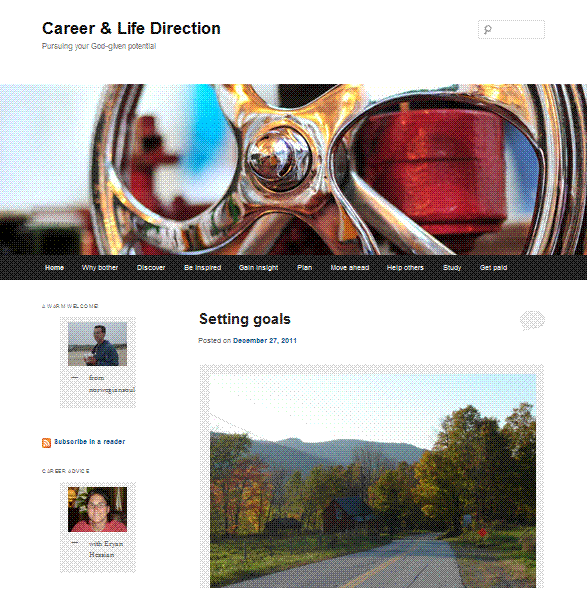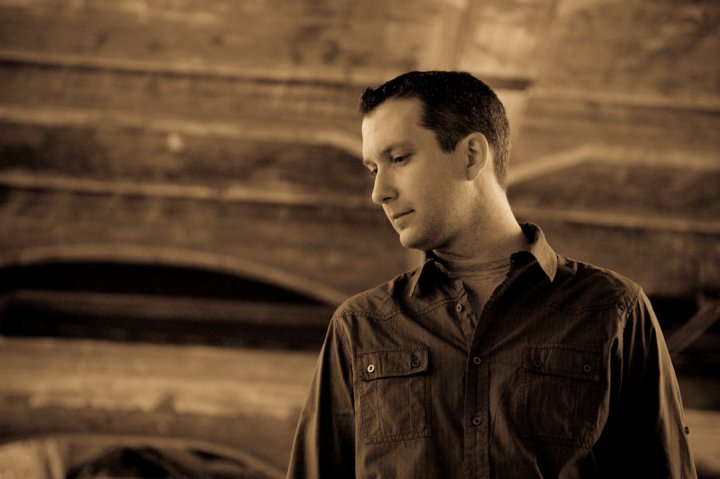Your clearness committee
- At November 24, 2012
- By Nathan
- In Career & Life Planning
 0
0
Major decisions can have far-reaching consequences. Making a wise decision that is a fit with who you are as a person can be a challenge. One way to improve the chances of personal success is to organize your own clearness committee before spontaneously launching out in a new direction.
It isn’t a good idea to get into the habit of making large decisions all alone.
Clearness committees have been around now for over 300 years. Although this term can be traced back to the Quakers, many other groups of Christians emphasis the importance of seeking wise counsel. And for that matter, this concept comes across to many people as simply common sense. But the problem is that it isn’t always immediately obvious to young people, etc. how to invite the input of others.
Organizing a clearness committee is one way to go about gaining insight when you are faced with a significant life decision.
The use of language changes over the years. Words can become emotionally charged in a negative way. For any number of reasons, committees have developed a bad reputation. Most people would rather not go there. When you hear “committee” your knee-jerk reaction may be to quickly get away.
For one thing, committee meetings usually take place in the evening when you are already tired after a busy day. It can feel like one more event to squeeze into an already hectic schedule; another item on your agenda that you would be happy to avoid. Then, these group meetings often lack the structure and focus that is required in order to make the time spent positive and productive.
Committee meetings have been known to go on and on and on into the night accomplishing very little by the break of day. Exhausted and frustrated, you finally make your way home in a bad mood.
And let’s face it: Any time when you get a diverse group of people in one small room for a long period of time it isn’t always a good thing. Some tend to take over. Others refuse to engage in the discussion. Soon small details take up large amounts of time. There is one diversion after another. Rabbit trails multiply. Personalities clash. Before long, the conversation takes a wrong turn – the debate gets nasty and personal. People pick sides and exchange words, etc.
Who would want to be a part of that?
The strength of a committee, however, is that a wide variety of insights and perspectives are available to address the problem at hand. Insight and perspective: that is what you need right now in order to make a wise decision that will impact your future in a positive way.
How does a clearness committee work?
First of all, you need to sit down and take some time to write down what you are thinking about doing and why. Go into as much detail as you can. Let’s say you are considering moving to Madagascar to teach Canadian tourists how to commune with large sharks out in the open ocean. Try to answer the who, when, where, why, and how questions. Maybe you could start by making a note of how fast you can swim and how much life insurance you have. Go from there.
Next, call up 5 or 6 people you know and trust and ask them to meet with you for 2-3 hours. Be clear that you are not asking them to give you advice or tell you what to do. The idea is to have others ask you questions and possibly make observations in order to clarify what you think you should do. Set a date and then send your friends what you have written a few days in advance so they have time to think about your situation.
When you meet, ask someone to lead your clearness committee and enforce the observation-and-question-only rule. Ask someone else to take brief notes of what is said during your time together. This will provide the basic structure and allow you to reflect on the insights that were offered later on.
Be prepared for awkward moments of silence. It is okay to not always have the air filled with words. But, at the same time, be prepared to benefit from the many thoughtful questions and observations your friends will offer.
This brief discussion isn’t intended as an endorsement of everything any particular Quaker person or group may believe. Nor is this to be taken to suggest that a quest for “inner truth” sums up the whole decision-making process. But this is one way you can begin to move beyond an excessively individualistic way of life and hopefully make better decisions.
By way of full disclosure, I have never organized or been a part of a clearness committee. But I wish I had. Looking back, this type of encouragement and support would surely have been beneficial early on.
So think about your future. Take the initiative. Do what you need to do in order to make wise decisions today.
© Career & Life Direction 2012. All rights reserved.
Avoiding codependent chaos
- At November 21, 2012
- By Nathan
- In Career & Life Planning
 0
0
Dysfunction is a part of life. Anyone who owns a computer or has lived very long with their eyes open knows this full well. Things break down – often. Relationships as well as nations and organizations don’t always work or function as well as they could. Sometimes it seems like they hardly ever do.
Have a look around and you will find conflict and tension, problems here and problems there, situations and issues – conditions that are chronic and costly.
The buck doesn’t always have to stop with you
So be encouraged. You are in good company. If things seem to be falling apart all around you it only means that you are a full member of a created order that has taken a wrong turn. You are simply a part of what theologians sometimes refer to as the “fallen” human race.
If you want to always have work and be in demand figure out how to fix something. Become a nurse, a doctor, or an engineer. Consider a career as a mechanic or a carpenter. Get into politics. Become a pastor or a priest. Develop a herbicide or a vaccine. Train to be a police man or women, etc.
The global repair business is and always will be wide open.
In an ideal world, relationships would always be healthy and mutually beneficial. But it doesn’t always work that way. Nobody I know is completely healthy or whole and my friends and acquaintances would surely say the same thing about me. If you happen to bump into someone who has it all together, please write and tell me all about your truly remarkable friend.
Codependency was first observed in proximity to alcoholics. This term originally described relationships that were distorted because of an addiction. How did it work? One person got addicted to a substance while another became addicted to an unhealthy way of dealing with an addict. One person needed alcohol too much and it was destroying their life. Meanwhile, the other person needed to rescue or take excessive responsibility for their alcoholic spouse, etc. And this habit was almost destroying theirs.
People who are codependent need to learn to let go and let others make their own mistakes and take responsibility for their own actions. People who are codependent need to learn how to start living their own lives.
In order to avoid this problem it is a good idea to occasionally ask yourself what you are not responsible for. May I suggest that you are not responsible for everything that takes place in the universe. Some situations in your country or your community or your church or your family or your circle of friends may also be beyond your control. The buck stops somewhere but it doesn’t always have to stop with you. Even if you are leading an organization, you cannot be held responsible for absolutely everything that happens in your organization. Draw a line.
Learn to think and tactfully say, “That is your problem and not mine. You need to deal with it – I don’t.” This may sound cold and selfish to some who are determined to be all things to all people, to rescue everyone and fix everything everywhere, and who delight in pushing themselves towards the edge of another nervous breakdown. But to others this will make perfect sense and come as a great relief.
It is possible to be a caring individual without necessarily becoming codependent. Keep in mind that caring in a codependent sense doesn’t help anybody in the end.
And it certainly won’t help you move ahead and make a difference with your life.
© Career & Life Direction 2012. All rights reserved.
Parker’s point
- At November 16, 2012
- By Nathan
- In Career & Life Planning
 0
0
Parker Palmer has a point.
He has something to say to young people who are starting out in life; a word of wisdom to those who have been at it for a while; and even a message for some in their senior years.
What he has to say has been said before – by many different people and in many different ways. But after putting down Let Your Life Speak: Listening for the Voice of Vocation somehow I appreciate Parker’s well-established point in a whole new way. For much of his life story is presented as a poignant illustration.
Raised to think that he could do anything, endowed with great expectation, Parker set out as an unstoppable “golden boy” only to quickly be confronted with his own failure and limitations. Oddly enough, it was after acquiring a Ph.D. from Berkeley that the cracks in his vocational direction began to show.
Looking back, he would come to realize that he was never suited for a career inside the academy. He wasn’t wired that way. If only he would have known.
But he wasn’t happy with his role as a community organizer in Washington, D.C. either. After five years it became clear that this definitely was not a fit. His strong sense was that he was living someone else’s life in the process of genuinely trying to do some good in the world. Life wasn’t working. There was too much inner tension It was time to move on, again.
What was the point of doing lots of genuinely good things that were not genuinely his to do? What was the point of trying to be someone he was not?
But, then again, what was he best suited for? What should a Parker J. Palmer type of a person be doing with his life? Midway through life, he needed to decide. The pressure was on. Unfortunately, this was not a question that was easily answered; it would take time and involve much turmoil and trouble.
His journey towards self and vocational discovery involved a decade long stopover at a Quaker community near Philadelphia called Pendle Hill. It also involved a serious battle with depression. Not that these two life events were connected. Both experiences, however, served to slowly clarify the direction his life would take.
Years of darkness and confusion would one day give way to greater light.
Trial and error. Community and reflection. Outer struggles and inner darkness. Over the years, Parker Palmer would eventually discover that he was a teacher, a writer, and an activist. That is what he was most suited for. That is what his authentic self almost insisted that he should be. Read what he has accomplished towards the end of this brief book and you might get the impression that Parker Palmer finally found his true calling.
Parker’s story is…well, Parker’s story. It may not be precisely like yours or exactly like mine. But Parker has a point nonetheless: It is very important to pay attention and listen to your life.
This internal focus may not be the whole story. But this is something you might want to seriously consider if you feel like you are living somebody else’s life.
© Career & Life Direction 2012. All rights reserved.
Weird and wonderful
- At November 12, 2012
- By Nathan
- In Career & Life Planning
 0
0
To be considered weird isn’t usually a compliment. On occasion, perhaps. But very few of you would assume that this word suggests a positive message or sincere praise. It isn’t taken that way.
A light-hearted banter between friends would be the exception. Oh yes, a warm-hearted jest puts all the bad word fears to rest.
Weird and wonderful: this is one explanation and a word combination that is reserved for the use of old friends.
But typically – by definition and cultural consensus – normal is in and weird is out. Way out. Unless, or course, your type of weird suddenly becomes normal and therefore is in. Don’t ask me how these things happen – they just do. All I know, is that everything gets complicated and very confused. And really weird. One minute you’re an outsider and the next you are ushered in. A cold shoulder is replaced with a red carpet. Suddenly the good vibes are coming your way. Your style becomes the style, etc. Soon it is all about you.
Not that I speak from experience. And likely, neither do you. Most of us are probably getting tired dancing around trying to avoid getting stamped with the wrong stamps and hopefully stamped with the right stamps. Stamping other people is reserved for an elite few.
Speaking of stamps, the weirdo label is usually even worse. This six-letter dynamo of a word has been known to stop grown men in the tracks; it has the power to cause determined walkers to turn and walk away. It is one of the heavy-hitters in the English language to be sure. It pack a punch; puts people in their place. It ranks right up there with extremist and sometimes evangelical.
Weirdo is the polar opposite of mainstream. Armed with such vocabulary, people who don’t believe in morality go about making moral statements. Call it modern magic or delusional democracy. Call it what you like. While it used to be a choice between out and in, now the sense is that we are dealing with right and wrong, good and bad. Imagine Darth Vader and Luke Skywalker standing side by side. That’s the idea.
Once you are in with Vader you’re out for good.
Moving along.
For that matter, wacko rarely signs up for word-duty in the same sentence as wonderful either. But maybe enough has already been said. The point has been made. Our attention has deliberately been drawn to the obvious: We all probably tend to prefer what is said to be normal; that is the label that most of us are looking for. At the same time, we often have the sense that our take on things or our society’s take on things is authoritative – even if it isn’t.
It is unsettling and unnerving to be around people who are different. It is awkward. You don’t know what to expect. And then, it is also a challenge to feel like we belong if we don’t know how we are supposed to behave.
For any number of reasons, we feel like we need to conform.
If we were to take things to the next level, it would go without saying that a person who is said to be off their rocker likely doesn’t get a lot of dinner invitations. Few tender souls want to be tiptoeing over for tea only to be confronted with a collection of crazy people sitting across the way on the couch. It’s unnerving. It isn’t normal. Can’t say that I blame them.
For the record, today’s rambling and reflecting about “weirdness” got started because someone I know very well (not to mention any names, or course) said something that caught my attention. The comment went like this:
“People need to take advantage of their weirdness.” Yes, that is a fairly accurate quote of what was actually said.
Rest assured, that believing whatever you like and living however you please was not the focus of the conversation. You know by now that you won’t be hearing a pitch for a purely relativistic philosophy of life here at Career & Life Direction. But how about a clarion call to get in touch with your inner weirdness?
How about that?
© Career & Life Direction 2012. All rights reserved.
Out of control
- At November 08, 2012
- By Nathan
- In Career & Life Planning
 0
0
Feeling like your life is out of control? There are times when it is necessary to allow others to have a large amount of control over your life. But usually this isn’t a good idea. Listen to a brief reflection (1:30) on the importance of having a healthy measure of personal control. Out of control
© Career & Life Direction 2012. All rights reserved.
The gift of guidance
- At October 31, 2012
- By Nathan
- In Career & Life Planning
 0
0
How could you help someone you know and love acquire a more clear sense of direction? Have you ever thought about that?
Are you looking for a way to help your son or daughter, your grandson or granddaughter, get off to a good start? Or, are you trying to simply support and encourage a friend during a time of vocational transition? Perhaps you also want to communicate that you care and want to be involved in their life.
Helping someone you love clarify their career and life direction could make a big difference. Your initiative now may benefit them in many ways down the road. But it isn’t always easy to know how go about it. And the whole process can become awkward. Soon the relationship feels strained.
Guidance that is appropriate for one person may not be as fitting for another
It is a good rule of thumb to always ask before offering? Get their input. Find out what type of assistance or involvement they would appreciate at this time. As children develop into adults, it is a good idea to increasingly do more and more asking and less and less telling. Look for a form a guidance you feel might be beneficial to them, and then ask if they are interested. Always ask.
Asking implies accepting the answer.
Even better, get to know your friend or relative. Spend time with them. And listen carefully to that they say. Encourage them to identify what they need and to communicate freely. It works best if they can take the initiative and ask you for your input or involvement. This way, they won’t feel like you are barging into their life and offering them advice they didn’t ask for and don’t need.
Acquiring a sense of direction can take time. And guidance that is appropriate for one person may not be as fitting for another. Some people need time to wander in the career and life direction wilderness for a while in order to figure things out on their own. But others likely would have benefited if more encouragement and support had been provided early on.
You will need wisdom to know when to step back and wait, and when to step up and offer to help.
Just so you know, it is possible to purchase the career planning and consulting services offered here at Career & Life Direction on behalf of another person. And here is one way of going about it:
1. Tell your friend or family member about these services.
2. Communicate what you would be happy to purchase for them – if they are interested.
3. If they are interested in exploring this online service, ask for their email address.
4. Go to the “Contact Information” page. Enter your name and email address. Communicate briefly what you would like to purchase on behalf of another person. Please include their name and email address in your note. Click “Send” at the bottom of the page.
5. Finally, go to the “Career planning and consulting” page and make your purchase.
6. Your friend or family member will then be registered in the TypeFocus program and soon receive an email telling them how to get started.
I hope that this service will help you help others.
© Career & Life Direction 2012. All rights reserved.
Positive personal power
- At October 29, 2012
- By Nathan
- In Career & Life Planning
 0
0
What type of thoughts are you preoccupied with? What do you tend to pay attention to? And what do you talk about again and again and again? Is there one unpleasant event in your past that you meditate on more than any other? And how is that working for you?
For that matter, what are you thinking about right now? Is your present frame of mind going to help you move ahead in your life – help you become all that you were intended to be – or is it going to hold you back. Will it feed your fears?
It sounds simplistic, but deliberately choosing what you will pay attention to has the potential to alter the course of your life. Yes, it can. You can let other people tell you what to think about, or you can choose what you will think about. Consider the implications of doing that for a moment. All things being equal, self-control via thought control could make all the difference.
What you think determines what you will do.
It is possible to essentially give up your right to manage what goes on in your own mind. Some people abdicate their responsibility. But it is also possible to reclaim this territory – to ram that flag deep down into the earth as if to say, “I claim this untamed wilderness land in the name of the King of…well, ideally the King of kings.”
Chasing the bad thoughts out and trying to drag some good thoughts in can be a daily struggle. But it is worth it. Over the years, engaging in this struggle will help you make a difference. This discipline will shape your future and define your destiny.
Living in denial is not the idea here. Plunging your head deep down into the sand is hardly the goal. The idea, rather, is to meditate – to fix your mind – on what is positive and good and helpful and productive.
Perhaps you have experienced a few very painful failures in your life. Who hasn’t? But, what is important, is not whether or not you feel like you have failed; what matters is how you choose to respond to your life situation. If you are reading this your life isn’t over yet. And may I suggest, that the best (from God’s perspective) may well be yet to come.
While it is a mistake to entertain illusions of grandeur, there isn’t much point in selling yourself short either.
When it comes to dreams and goals, picture yourself doing a little more good in this world than you think you can. Imagine reaching just a bit higher than your present understanding of your abilities allow. Raise the bar too high and you will become discouraged and give up. But a good coach will help you raise the bar, so to speak, just the right amount. I’m indebted to the senior pastor at my home church, Mike Smart, for this general insight. It is good advice.
We all need other people. But at the same time, it is possible to partially coach yourself. My hunch is that many people think negative and self-defeating thoughts on a daily, weekly, and monthly, basis. My guess is that this a very common routine or rut to fall into. Once you are in, it is hard to get back out. Before you know it, negative thinking becomes a way of life. Your thoughts become almost all negative almost all the time.
Opening a window can sometimes let some much-needed fresh air into a room. Opening your mind to a new way of thinking can have the same effect.
Today, you don’t need to let your mind go where you have always gone. It doesn’t have to happen. With some discipline and encouragement you can regularly go to a better place. It won’t be easy, but you can change. Yes, to start things off, consider that encouraging thought.
A word of caution: As far as I can tell, my thoughts do not determine what is real and likely neither will yours. Hurricane Sandy is going to show up on the East Coast and do what it does whether we think it will or not. This isn’t some sort of mind over monster-storm message. Life is filled with difficult and sometimes very dangerous situations that you will need to deal with directly.
But you will be much better prepared to face the future if you are not constantly thinking about problems and painful situations in your past.
© Career & Life Direction 2012. All rights reserved.
The problem of play
- At October 25, 2012
- By Nathan
- In Career & Life Planning
 0
0
*Today’s post tilts towards life direction and explores the relevance of your worldview
Imagine that you are sitting in front of a high-tech device designed to suck positive and authentic spirituality completely out of your life. What do you suppose would be different about your daily life once this machine did its job?
For starters, participation in public worship would be a thing of the past. It simply wouldn’t be a priority. But you may be surprised to observe a lot of other basic human behaviors and traditions making their exit at the same time. Healthy laughter and play would be among them.
There they go. One after another. Going, going, gone.
That is how it works. Eject God from your life, create your own little society, and eventually – at least for the quiet and thoughtful revolutionary – play becomes a problem.
Problems galore
On the surface of things, play is hardly a problem. Play is the one activity in life that people look forward to when surrounded by problems.
The routine is familiar. You come home after a hard day on the job, or perhaps after another long day looking for a job, and collapse on the couch in a daze. You turn on CNN hoping to hear some lighthearted reporting, only to be told that the USA, Canada’s critically important trading partner, is still adding billions of dollars to their national debt each day. Anxiety and frustration sets in. You sure didn’t need to hear that.
Putting down the remote, you wander into the kitchen and notice the latest VISA bill lying on the counter, the one you were hoping would simply disappear. No, your personal finances aren’t looking all that great either – as if you needed to be reminded.
Glancing down the hall, you catch a glimpse of your two-year-old son with his hand in the dog food dish (again) and about to raise it up to his mouth. Exactly what is so fascinating about that Purina Dog Chow? you wonder. Crisis averted, you step out into the back yard for some peace and quiet just as your faithful golden retriever is closing in on a black and white striped creature of some sort over by your neighbour’s barbecue.
Running faster than you have in years, you find yourself seeking refuge from the reek in the front yard, under the basketball hoop, hoping that Bob doesn’t kill you. Finally, after pulling yourself together and catching your breath, you have chance to unwind; a chance to relax and play.
But what if play is really just another problem? “Play? No, not play,” you say in exasperation, “it just can’t be a problem!”
Problems in the West
Problems. We all have them. They come in all shapes and sizes. We all have a daily dose to deal with. But in what sense is play, and healthy laughter in particular, a problem?
Some might be thinking that play is a problem nowadays because too many people are refusing to work and eager to play. Fair enough, if most everyone is toddling around doing a bunch of “whatever” with their lives, exactly who is going to make the gravy for the proverbial gravy train?
But in this case, the problem of play is rather that this basic, popular, and positive human experience doesn’t fit in a specific worldview in the western world. It doesn’t fit. And it has to fit somewhere.
Beliefs that block play
Western liberal orthodoxy, for lack of a better label, is the handy-dandy philosophy of life, legislated worldview, and civic religion, that millions of people have drifted towards and converted to without even realizing it.
It seems to offer so much, and has been marketed magnificently.
It provides the framework or vision for living in the West after God, and Christianity for the most part, has been removed from the minds of the ruling elite. It is presented as the safe alternative to the bad-old-days when, so the story goes, people were always fighting over religion. It is sold as the progressive and enlightened position to hold in contrast to the dark ages in the past. It is the background public philosophy that includes everyone and is supposedly committed to equality. It celebrates a new-found freedom from the oppression of an early era. It is all about love, love, love, while people opposing it are inevitably assumed to be steeped in hate.
All sorts of neighbourly and nice, sincere and kind, educated and ordinary folks are joining this relatively new naturalistic faith.
Which would you prefer? To be considered inclusive, intelligent, tolerant, and loving…or to be known as the guy who is narrow-minded, ignorant, bigoted, dogmatic, and hateful. Yeah, ouch!
There are actually all sorts of problems with this ideology. And the prominent place of laughter and play throughout this world creates one of them. Play is a problem. How do liberals account for a deep conviction held by billions of people? What are they to make of the global consensus that playing is normal? Exactly how do they interpret all the happy, joyful, jumping, and joking around?
When an average person on the street in Calgary or California or Cairo engages in some type of playful activity, what precisely would they say is going on?
Survival stories
You are sure to bump up against any number of nicely nuanced naturalistic theories about laughter during your journey of discovery.
One of my favorites so far, is taken from an essay entitled Laughter by Henri Bergson and endorsed by comedian Mike Meyers in the book Why is God Laughing? Here is a rough translation: Laughter is a reflex response which we humans have in common with crocodiles, and other cheery reptiles, that takes place when we realize we are going to die.
So the next time you share a good laugh with a few friends at the office, on the construction site, or while working out in the field…you can bring up the “Death Reflex” theory as a way of explaining what you all experienced moments ago. Will your friends be convinced? Will they buy it?
And this, far from being a straw man argument, is only one example of the odd attempts to “explain” laughter and play. Hammering a square peg into a round hole is a possibility, but not without doing serious damage to the poor peg.
Play is a problem.
Finding a place for play
People play. All sorts of different kinds of people around the world laugh and play each and every day. Meanwhile, a small number of powerful people in the western world have cobbled together a worldview that does not have place for this basic human experience. Play is a problem for Liberal Orthodoxy in the West. It is a problem for the LOW philosophy of life.
What is the solution? There are several options, some better than others. The attempt to change or redefine play so it fits with secular dogma hasn’t been working so well. So in order to find a place for play it is necessary, first of all, to put down the hammer and try to come up with some really clever stories that might convince some people that authentic laughter and play fits after all. Good luck with that.
Another option is to accept LOW as the truth that trumps everything else (which is what it claims to be anyway) and campaign to convince the world, and maybe even your own kids, that modern and progressive people do not play. Don’t forget to try to convince yourself. In other words, the place for play is in the trash can. For it belongs to a bygone era.
As it turns out, healthy laughter and play fits within the secular faith only in the sense that any and every bizarre and bewildering behavior also fits is this “whatever” worldview.
The problem of play will not go away.
A third option is to search for a different worldview altogether that clearly has a specific place for this basic human experience. Reverse the machine.
Bowing your head in quiet worship and throwing your head back in a fit of laughter have a lot more in common than many people realize.
© Career & Life Direction 2012. All rights reserved.
A need to impress
- At October 23, 2012
- By Nathan
- In Career & Life Planning
 0
0
In the end, devoting your life to doing well in the family or friend or community or culture or – even worse – mainstream media polls is a bad idea. It is a big mistake. For this misguided life emphasis results in giving other people way too much power over your life. Your vision quickly becomes clouded as you lose a sense of your larger life purpose. Instead, sadly, daily life is reduced to playing endless little competitive and comparative games. And that routine gets old and wearisome after a while.
Thinking or believing or doing or saying what you need to simple to please others is a waste of time.
Yes, it is much better if you can break free from an excessive concern about what other people think early on. Find a way to move beyond an obsessive preoccupation with the opinions of your peers. This shift in your thinking will help you move ahead. It will reduce your level of stress and anxiety and free up a substantial amount of time. Relief from the controlling and arbitrary opinions of other people is possible. Amen to that.
One way to do this, is to get to know a wide variety of people. Mix things up. Expand your horizon. Enlarge your social circle. Parachute into another culture if you can. What will you discover? Different people and different groups of people often have different opinions. How about that! What amounts to “Thus saith the Lord” in one setting turns out to be insignificant in another. Oh yes, some people will smile and others will frown no matter what you do with your life. That’s how it works. So expect some criticism and some I-am-definitely-not-pleased-with-you-talk coming your way. This will happen. The trick, however, is in knowing who to listen to.
When people lose a sense of respect for the words of their Creator their own thoughts and opinions have a way of becoming much more important than they should be. Canadian or American or “North Polian” culture suddenly becomes the norm and the standard by which all others are judged. And, of course, the gate-keepers in any one culture become the gods. While there is great variety among the lesser deities, money and possessions and success often becomes the measure of personal worth. The Almighty dollar, for example, is considered worthy of a never-ending chorus of praise.
Think clearly. Remain calm. Learn to see through all the cultural shenanigans. Learn to filter mere human opinion. You will be glad you did.
There is no denying, though, that being put down is often a negative and painful experience. It isn’t likely something that you will look forward to. Comparable to a physical injury, constant condemnation can have a crippling effect. But only if you choose to believe the lies that are coming your way. And failing to impress can on occasion be a positive experience: It can serve to open your eyes.
Stop for a moment and think about a specific time when you managed not to royally impress someone you were really hoping to. It could be a recent experience or more of a distant memory. For whatever reason, you didn’t get the approving nod or the pat on the back. Congratulations were not in order after all. Nobody felt led to offer a word of encouragement or genuine affirmation. Rather, you were given the impression that you were nothing special. Not particularly outstanding in your field or anybody else’s field either.
Looking back, you definitely did not receive the response you were hoping for. But, so what?
Life goes on. So they weren’t impressed. Who cares? Why does one little persons’ opinion get to matter so much? Do you really want the limited perception of another human being to determine what you do with the next twenty years or even the next twenty minutes of your life? Do you want to be controlled by their fickle feelings or inappropriate behaviour? Does that make sense?
It goes without saying that we can all sometimes be much more impressed with our own opinions than we should be. It happens. We decide that we are not amused about this or that, about him or about her, and then assume that the universe must readjust itself to our perspective. So don’t be too hard on the people who put you down or criticize you unnecessarily. Chances are that you have done exactly the same thing in other situations. I have. We all have.
If only we could learn to redirect this partly positive need we have to impress or please someone somewhere.
© Career & Life Direction 2012. All rights reserved.
Living on the edge
- At October 16, 2012
- By Nathan
- In Career & Life Planning
 0
0
One benefit of living in an unsettled state is that you may be in a better position to appreciate how unsettled life actually is.
True enough, too much stability messes with your mind. So-called security clouds your vision; it serves to distort your view of this world. It is like a drug: dulling your sense of what is going on around you. Prosperity and “success” can make you forget about all the possibilities and perils. It blinds you to what may be just around the bend or for that matter – over the edge.
Feeling too settled and safe down here sometimes leads to living in a state of denial. An inappropriate sense of pride quickly obscures 10,000 different ways you can fall.
Meanwhile, living on this earth continues to be comparable to wandering along on the edge of a towering cliff. Yes, it is a very long way down. So choose your steps carefully, my friend. For despite some improvements in the human situation, your journey is going to be precarious, dangerous, and unpredictable. You can’t micro-manage the madness no matter how hard you try. To mix the metaphors, living on this earth is like walking through a minefield over in Kandahar; it is like jumping out of a balloon 20 miles above the earth daily.
Assuming safe passage makes about as much sense as banking on the banks or buying season tickets for the next 10 years to watch the NHL.
Do you think that this is an overly negative assessment of the future? Is it really?
Consider that your life could come crashing down all around you in the time it takes to send a text. It could. In a moment, all that you have built could instantly be blown away. What you thought was solid and trustworthy might turn out to be as flimsy as can be. You might not be able to phone 911 fast enough. And global warming may well be the least of your concerns. Your health could be failing even now; cancer may have settled in. The Ayatollahs might be arming much faster than we think. One good-sized asteroid landing in the ocean could temporarily create ocean-front property here in Saskatchewan. Three-score and ten might turn out to an elusive dream for entire cities, nations, and civilizations.
There are no guarantees that you will live long enough to read to the end of this brief post or that I’ll live long enough to write it. How could we be so brash as to assume and expect such a thing?
But when you have the house, the car, the career, the bank account; when you are connected, part of the community, and feeling like you fit; when you are riding a wave of public approval and savouring your success; when you are packing a prestigious degree and when your country’s GDP is rising higher and higher…right about then, the “movers and shakers” usually begin to shake. No, it won’t necessarily go on like this forever – moving from one level of personal glory to another. That, however, is what we are all tempted to think.
The “my-empire-will-never-fall” talk will one day come to an end.
At this point, some people – people with good intentions – may be tempted to drag God into the conversation as a way to deal with an increasingly awkward and unpleasant situation. Surely the Lord is going to intervene to prevent anything undesirable from happening to me. Right? Not necessarily. Read God’s book from cover to cover, take a good look around, and you may discover that it doesn’t always work that way. Some desperately want to read the Bible that way. But it doesn’t work.
The reality is that bad things continue to happen. The reality is that all hell could break loose and you could get caught in the crossfire. Many of the early Christians did and many of the modern ones still do. Read the Old Testament, but realize that in some ways the old deal doesn’t still apply. Safety and security were part of the package back then and so was brutal destruction if people disobeyed. Over in the New Testament, if anybody had connections and was on good terms with God it was Jesus. And you know how life turned out for Him.
So don’t expect an easy life. I hope you succeed, but don’t let your success deceive you. Don’t expect to avoid danger along the way. But don’t expect that you will be up there all alone either.
Speaking from experience, you will never be alone.
© Career & Life Direction 2012. All rights reserved.
Feeling lost: finding your way
- At October 11, 2012
- By Nathan
- In Career & Life Planning
 0
0
What would it take for you to get from where you are right now to where you need to be? And what do you need right now in order to take the next step in your life?
How would you feel if you were told that what you really need is a large dose of confusion and despair? Sounds good, right? Sign me up. This is going to be great! True, it is usually healthy to possess a measure of calm composure and self-confidence, but there are admittedly times in life when this is counterproductive.
Feeling lost can be necessary on occasion in order to find your way. It can help. Lost people fire off their flares and eventually get found. The desperation pays off after all – in the end. And I wonder if feeling completely lost isn’t, more often than not, a standard part of the career and life direction process.
What do you think? Has this ever been the case in your life? Could it be that a profound lack of direction has been the motivating force guiding even now? If so, where would you be without it?
Men, of course, are famous for refusing to stop and ask for directions. They’ll just keep right on driving all over the place. Those men. Hour after hour they’ll grip the steering wheel, block out the increasingly vocal protests in the back seat and drive on – into the night. The situation has to be really, really bad before they finally pull over and ask for help. Have you ever asked yourself why? Part of the answer could be that simply asking for directions has been interpreted as a sign of weakness and – even worse – as an indication of failure. It is that bad. Men assume that there is sure to be a loss of face and a loss of respect if they admit that they are lost.
Feeling lost and being lost isn’t an option. Getting good and lost isn’t one of the standard things to do if you want to make a good impression. And if you do happen to lose your way, this isn’t probably an experience you enjoy talking about…over coffee…with all the other guys. Now let me tell you all about the time when I really made a fool of myself. Men in particular tend to avoid this experience at all costs. No thanks.
In saying this, I am assuming that feeling respected is a basic and legitimate need that men have. Women need to feel respected as well, but not apparently to the same extent. Please note that I am not saying it is okay to treat a woman with disrespect. It is just that being respected is very, very, very important for a man. Ask yourself how important it is on a scale of one to ten. Ask any man you know.
And yet it needs to be said that feeling lost isn’t typically an experience that men or women would tend to value or celebrate. No, this isn’t likely what either sex will feel inclined to sing about when we remember our favorite things.
Sometimes, though, feeling lost is part of the process.
A number of years ago, I had a vivid dream the night before setting out on my first international adventure. Friedrichshafen, West Germany, was my primary destination. There would, however, be stops in Austria, Holland, Switzerland, and Italy. No, I didn’t speak German or any other European languages. No, I had never been to Germany or anywhere else in Europe before. Yes, I would be travelling alone. And no, I didn’t know anyone at the school where I was going to study.
This was sure to be an exciting adventure, but it was also a little scary. It involved being dropped into an alternative universe. To add to the excitement, the stock market decided to crash shortly after I arrived in the old country. How nice.
Without going into the details, my pre-voyage dream was all about feeling lost and out-of-place. Surprised? Probably not. But here is the point: An experience that started out with unpleasant feelings turned out to be one of the best years of my life.
Feeling lost doesn’t have to hurt you. This awkward experience can actually help you.
And how many people can truly say that they have never felt this way?
© Career & Life Direction 2012. All rights reserved.












































